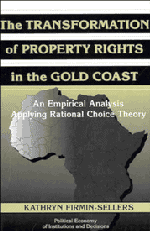 The Transformation of Property Rights in the Gold Coast
The Transformation of Property Rights in the Gold Coast Book contents
Chapter 1 - Introduction
Published online by Cambridge University Press: 08 January 2010
Summary
One of Africa's greatest tragedies lies in its apparent inability to take advantage of the continent's abundant natural resources. African governments confront persistent poverty and famine; they are forced to spend scarce resources on food imports to feed a burgeoning population. These conditions signal a clear need for greater agricultural production; yet African farmers cultivate only one fifth of the continent's 2.5 billion acres of arable land.
Social scientists attribute this tragedy to myriad causes. Civil war and ethnic unrest drive people from their homes and farms. African governments depress the price of food and export crops, destroying the farmers' incentive to produce. Credit markets are incomplete, depriving farmers of the capital they need to move beyond subsistence production. Underlying and exacerbating each of these factors, however, is a more fundamental problem: the nature of African land tenure. Throughout Africa, property rights to land are fluid and insecure. Private property, state ownership, and communally defined rights coexist in an ever-changing mix. Definitions of communal tenure continually shift. The farmer or entrepreneur who claims land under one property rights system can never be certain when (or if) others will challenge his claims; neither can he predict whose claims the local community or state will uphold.
Economists of all persuasions warn that insecure property rights to land and other economic resources inhibit economic growth. Where land rights are insecure, the rights-holder does not know whether he will control either the land or the profits from the land in the future.
- Type
- Chapter
- Information
- The Transformation of Property Rights in the Gold CoastAn Empirical Study Applying Rational Choice Theory, pp. 1 - 18Publisher: Cambridge University PressPrint publication year: 1996
